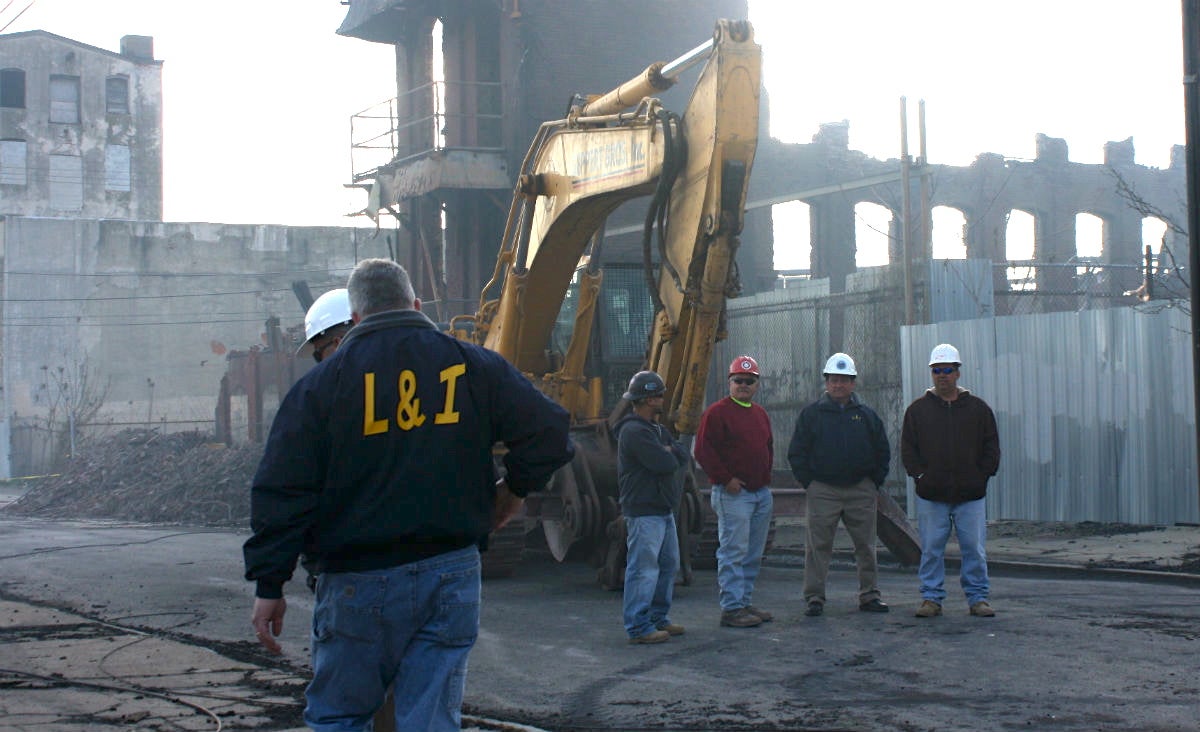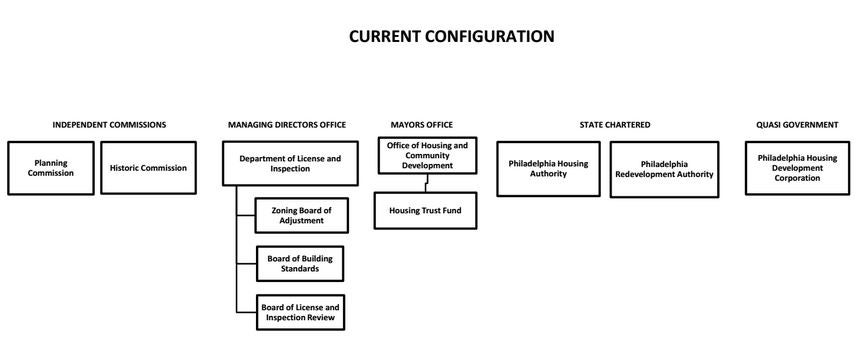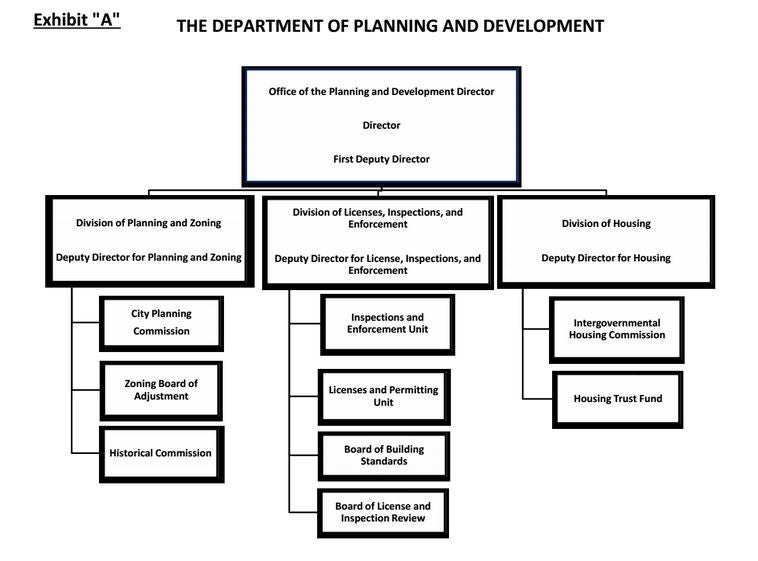Proposals would dismantle enforcement agency, centralize planning and development

City Council President Darrell Clarke introduced a bill on Thursday that would make sweeping changes to the structure of the municipal government by creating a new cabinet-level Office of Planning and Development and centralizing the functions of various regulatory boards and commissions under its direction. At the same time, Mayor Michael Nutter received a report from a special advisory commission he’d appointed to review the Department of Licenses and Inspections, recommending a host of changes to that agency.
Both proposals would effectively dismantle L&I, and Clarke’s bill would enact a wider restructuring of the regulatory agencies that deal with building and development in the city.
Amending the Charter
Council President Clarke’s plan would require voters to approve the change via a ballot question in the primary election next May, when voters will also select general-election candidates for Mayor and City Council. Two thirds of Council members must support the bill in order for the question to appear on the ballot. The proposal was first reported by The Inquirer.
Most significantly, the proposal would dismantle the Department of Licenses and Inspections and distribute its duties into a number of divisions under the new Office of Planning and Development. The City Planning Commission and the Historical Commission would also be placed under the direction of the new Office.
The Office would be directed by a Mayoral appointee and organized into three divisions: the Division of Planning and Zoning; the Division of Licenses, Inspections, and Enforcement; and the Division of Housing. The Housing division would include an entirely new Intergovernmental Housing Commission that would be charged with administering the Housing Trust Fund and managing governmental resources in order to “increase the availability of affordable, workforce and market rate housing.”
Below are the current and proposed organizational charts for the affected agencies, provided by Clarke’s office.
If placed on the ballot and approved by voters, the plan would take effect under the next Mayoral administration.
While it’s unclear what the immediate, practical impacts of the legislation would be for the boards and commissions it would affect, or whether there would be any at all, one provision of the bill clarifies that its adoption should not be interpreted as abolishing and re-establishing the Planning Commission, the Zoning Board of Adjustment, the Historical Commission, and other boards. Instead, those bodies would continue to operate, and all appeals and other matters pending before them would remain on their calendars.
Under the Home Rule Charter, the Planning Commission is responsible for overseeing the physical development of the city and for maintaining a Comprehensive Plan. The Comprehensive Plan is not only the official map of the city as it’s currently laid out, but is also authorized to “provide for the improvement of the City and its future growth and development and afford adequate facilities for the housing, transportation, distribution, health and welfare of its population.”
Under the legislation introduced by Clarke, those responsibilities would be transferred to the Division of Planning and Zoning. The Planning Commission would be a subdivision of that entity, along with the zoning board and the Historical Commission. Clarke’s office said that the restructuring would have no impact on the day-to-day operations of the Planning Commission or on its responsibilities. It would simply be moved into the Department of Planning and Development.*
Clarke’s plan would also add the Historical Commission into the Home Rule Charter for the first time.
Jane Roh, a spokeswoman for Council President Clarke, said that the proposed charter amendment is intended formalize the functions of the various entities named in the bill and contribute to the streamlining of the regulatory process for development in the city. For years, Council members and developers have complained that city agencies operate in “silos” and communicate poorly with one another. Clarke’s bill is an attempt to address that complaint by putting those agencies under one roof.
Mayor Michael Nutter’s press secretary Mark McDonald said the administration would comment on the legislation when it goes before a committee. Alan Greenberger, the Deputy Mayor for Planning and Economic Development, was unavailable for an interview on Thursday.
Anne Fadullon, president of the Building Industry Association of Greater Philadelphia, said she hadn’t had a chance to review the proposal in detail, but added, “The BIA applauds the efforts by Council President Clarke to facilitate development in Philadelphia and the BIA looks forward to working with Council President Clarke and the Nutter administration toward that end.”
If the legislation is approved by Council, the following question will appear on the ballot next May:
Shall the Philadelphia Home Rule Charter be amended to create a new Department of Planning and Development, headed by a Cabinet-level Director, to oversee the City’s planning, zoning, licensing, inspection, enforcement, and housing functions, with the City Planning Commission, Philadelphia Historical Commission, Zoning Board of Adjustment, Board of Building Standards, Board of License and Inspection Review, and a new Intergovernmental Housing Commission located in such Department?
Reviewing L&I
The Mayor’s special advisory commission on L&I was appointed in the wake of a building collapse at 22nd and Market streets last year that killed six people and led to the suicide of an L&I inspector. This week, Nutter received the recommendations of that commission. Those recommendations too call for L&I to be dismantled.
The first recommendation is an idea that has been discussed in political and bureaucratic circles for some time: it calls for the L&I to be split into two agencies, a Department of Buildings and a Department of Business Compliance. L&I is currently responsible for a host of tasks, from demolishing unsafe buildings to enforcing the fire code, issuing zoning permits and processing business license applications.
Nutter was elected after famously vowing to “blow up” the Department in response to perennial complaints about corruption, favoritism and incompetence at the agency. Since he took office, the agency’s workforce has shrunk, but it has managed in recent months to release new data, and it is wrapping up work on its project eCLIPSE, which will be a central hub for information on all the licenses and violations L&I monitors.
Nutter has already made one major move after receiving the commission’s report. On Thursday, he moved the Dept. of L&I from the Dept. of Commerce to the Dept. of Public Safety, reporting to Deputy Mayor Everett Gillison.
Among the other recommendations of the advisory commission:
-
Transfer responsibility for fire inspections to the Fire Department.
-
Improve coordination of code enforcement efforts by L&I and the Law Department.
-
Form a vacant property task force within the new Department of Buildings.
-
Submit the agency to regular audits by the City Controller’s Office.
-
“Rigorously implement” new demolition requirements.
Also on Thursday, Nutter announced the creation of the L&I Implementation and Accountability Committee “to oversee potential organizational and statutory changes to the Department based on the Commission’s major recommendations.”
“As it stands today, L&I is burdened with an ever-increasing set of responsibilities, many of which have nothing to do with building safety,” said Glenn Corbett, chairman of the advisory commission, in a statement. “In the wake of the tragedy at 22nd and Market Streets, our Commission is calling for the creation of a new Department of Buildings led by a licensed engineer or registered architect. Building safety must be job one in the new department. We believe that our set of over 30 recommendations will help guide the City of Philadelphia in carrying out its’ fundamental public safety role.”
Read the commission’s full report here.
*Note: this section has been edited for clarity.
WHYY is your source for fact-based, in-depth journalism and information. As a nonprofit organization, we rely on financial support from readers like you. Please give today.






